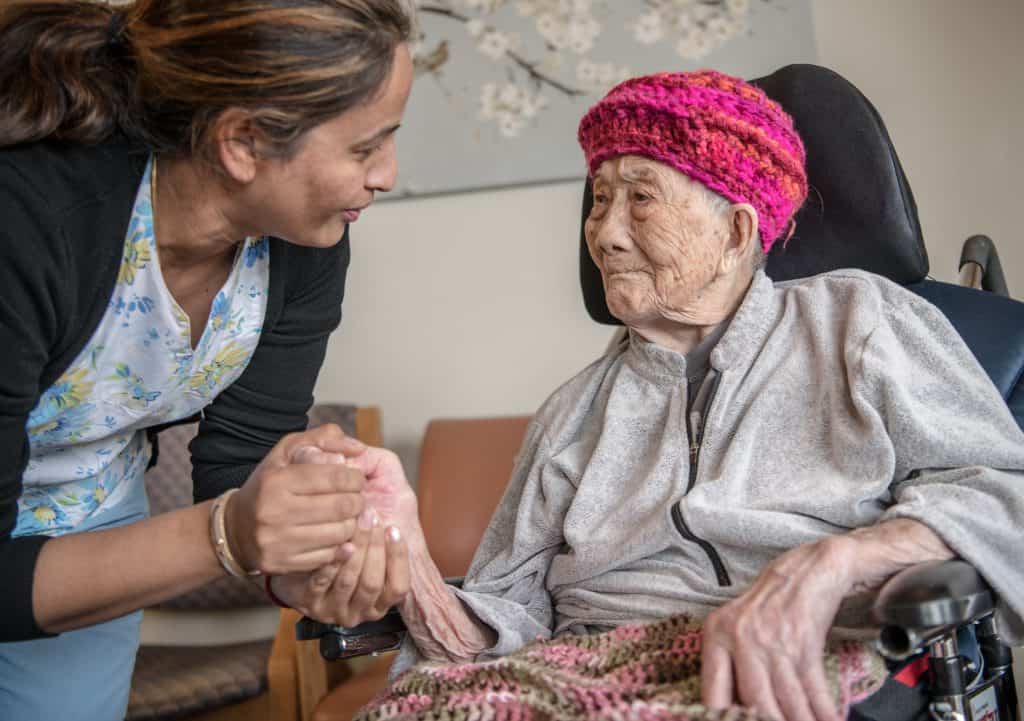This article is part of our continuing “Research & Innovation” series that highlights the new research and ongoing innovation that’s happening at St. Paul’s and other Providence Health Care sites.
At St. Paul’s, compassion and innovation go together like a hand in a glove. And for more than 126 years, the results have been life changing.
Consider Sister Charles Spinola. In 1918, the ether that’s used to put patients to sleep is so cold it often sends them into shock. Sister Spinola’s concern for her patients’ comfort and safety inspires her to develop a machine that warms the gas before it’s administered. Her invention changes the practice of anaesthesia: the machine is patented, sold, and used in hospitals for years.
Caring for the whole patient, harnessing our creativity and ingenuity, and collaborating across teams have always been the hallmarks of medicine at St. Paul’s.
As we look ahead to the new St. Paul’s Hospital in just five short years, this unique approach will pave the way for today’s health care heroes to transition seamlessly from Burrard Street to Station Street.
Building muscle memory
We’re already honing the resilience, leadership, and muscle memory we’ll need at the new hospital. Perhaps nowhere is this more evident than in our COVID response.
Even before the pandemic was officially declared, we began to mobilize resources throughout Providence Health Care (PHC) and across British Columbia.
Almost immediately, our lab became one of BC’s main testing sites for the SARS-CoV-2 virus. By the time we reach the anniversary of the lab’s very first COVID-19 test (February 14, 2020) we will have run more than 200,000 COVID tests. We now have the highest testing capacity of any lab in BC. We’re also the only hospital lab in Canada doing whole genome sequencing of the COVID-19 virus.
In May, we opened the doors to our post-COVID recovery clinic: a convergence of clinical care, leading-edge research, and almost-unprecedented collaboration between clinicians, researchers, health authorities, and universities. Thanks to this province-wide initiative, we are caring for patients at diagnosis, and treating and even preventing the complex after-effects of COVID-19.
Protecting the most vulnerable
We already knew – and the pandemic confirmed – that we need a whole new structure for elder care. Indeed, one of the most heart-breaking aspects of the pandemic has been its devastating impact on seniors and their families. This has been especially resonant at PHC.
Seniors account for 25% of the patients at St. Paul’s and PHC has five long-term care homes and an assisted-living residence. We are committed to safeguarding our most vulnerable patients and residents today and to doing everything possible to improve care going forward.
For example, when the pandemic hit, we were well-staffed and well-equipped thanks in part to the generosity of our donors. As a result, we’ve been able to keep residents engaged physically, emotionally, and spiritually. Thanks to your donations, we have an incredible music therapist and we have things like iPads so residents can participate in activities via Zoom and FaceTime.
Looking ahead, seniors’ wellness is a cornerstone of the new hospital’s mandate to improve care and change lives for all British Columbians.
Plans are underway to expand and enhance PHC’s Centre for Healthy Aging at the new St. Paul’s Hospital. In addition to a bricks and mortar location, the Centre will facilitate community care and supports for seniors province-wide.
And we’re preparing to break ground on two transformative dementia villages: one in Comox and one in Vancouver.
These homes will pioneer a “household” model where each resident will have a private room with shared common living space. Each household will have 12 residents supported by a staffing model that aims to provide a consistent team for each household. This will empower the staff members closest to the residents and help minimize potential exposure to infection.
The model will also encourage residents to engage in their environment as they choose and are able, including everyday household chores and outings into the larger community.
Our silent-yet-powerful partner
Underpinning all the efforts of our incredible team right across PHC is a silent partner: technology.
Among other things, leading-edge tech allows us to speed up testing and deliver more precise diagnostics. Pinpointing what’s wrong and moving quickly and effectively to fix it is the very definition of compassionate care. Nowhere is this more evident than in our lab.
Beyond its achievements in testing and understanding the coronavirus, our lab is the first and only one in BC with an electron microscope: it’s used to diagnose and treat all of BC’s kidney patients.
We also have some of the world’s most sophisticated tests to diagnose group A strep and sepsis. These tests mean we can identify septic patients faster and choose the antibiotics best suited to their specific infection.
As you can see, we’re already saving and improving lives in a hospital built for – and in – another century. Imagine what we can do when we move our people and our intrinsic culture of compassion and innovation to the new St. Paul’s Hospital on the Jim Pattison Medical Campus? The sky is the limit.
When you give to St. Paul’s Foundation, you give our health care heroes the tools and equipment they need to do what they do best: provide compassionate care, bring their ideas and ingenuity to work, and transform lives across BC. Give today and transform the future of health care at the new St. Paul’s Hospital.
